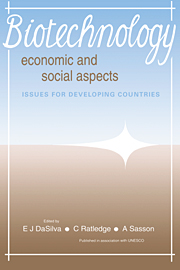Book contents
- Frontmatter
- Contents
- List of contributors
- Preface
- 1 Biotechnology: the socio-economic revolution? A synoptic view of the world status of biotechnology
- 2 Bioethanol production: economic and social considerations in failures and successes
- 3 Biofertilizers: agronomic and environmental impacts and economics
- 4 Microalgal biotechnology: is it an economic success?
- 5 Production of useful biochemicals by higher-plant cell cultures: biotechnological and economic aspects
- 6 Mushroom production – an economic measure in maintenance of food security
- 7 The economic viability of Single Cell Protein (SCP) production in the twenty-first century
- 8 The impact of biotechnology on international commodity trade
- 9 Biotechnology: socio-economic considerations, intercultural perspectives and international viewpoints
- 10 Joint microbial biotechnological ventures in developing countries: social promises and economic considerations
- 11 The economic and social implications of gene technology to developing countries
- 12 Making biotechnology appropriate – and environmentally sound
- 13 Information support for research and development in biotechnological applications
- 14 The effects of emerging biotechnologies on plant and animal agriculture – a viewpoint
- Index
Preface
Published online by Cambridge University Press: 04 August 2010
- Frontmatter
- Contents
- List of contributors
- Preface
- 1 Biotechnology: the socio-economic revolution? A synoptic view of the world status of biotechnology
- 2 Bioethanol production: economic and social considerations in failures and successes
- 3 Biofertilizers: agronomic and environmental impacts and economics
- 4 Microalgal biotechnology: is it an economic success?
- 5 Production of useful biochemicals by higher-plant cell cultures: biotechnological and economic aspects
- 6 Mushroom production – an economic measure in maintenance of food security
- 7 The economic viability of Single Cell Protein (SCP) production in the twenty-first century
- 8 The impact of biotechnology on international commodity trade
- 9 Biotechnology: socio-economic considerations, intercultural perspectives and international viewpoints
- 10 Joint microbial biotechnological ventures in developing countries: social promises and economic considerations
- 11 The economic and social implications of gene technology to developing countries
- 12 Making biotechnology appropriate – and environmentally sound
- 13 Information support for research and development in biotechnological applications
- 14 The effects of emerging biotechnologies on plant and animal agriculture – a viewpoint
- Index
Summary
From a flood of journals, periodicals, news-items, patents and commercial ventures the word ‘biotechnology’ has gone out as the harbinger of prosperity and progress. Biotechnology, the generic name for a variety of biological processes, is increasingly being treated as the cornerstone of a number of development scenarios. This consideration stems from an awareness that societies wishing to achieve, maintain or enhance their living standards will eventually have to produce goods and services that are internationally competitive and devoid of economic redundancy, on the basis of their eventual market-quality and social performance.
Biotechnology costs money. It is the world of business and investment. It is all to do with making and selling products in a highly competitive world. Start-up requires extensive research. Product and process development costs even more. Marketing is crucial for success and is also very expensive. Consequently, in recent years and given the first flush of apparently successful products being launched followed by the reality of sobering endeavour, several developed and developing countries are now taking a hard look at the large-scale investments that are required in the furtherance of biotechnology. This theme is dealt with, to some extent, in the view that is presented here of the socioeconomic revolution that has been fuelled by biotechnology. This important aspect is dealt with in many of the chapters of this book and in particular in those concerned with the production of bioethanol, biofertilizers and Single Cell Protein. Biotechnologies that lend themselves to counteracting environmental damage and enhancing economic returns are exemplified in the technologies of microalgal culture and mushroom production.
- Type
- Chapter
- Information
- Biotechnology: Economic and Social AspectsIssues for Developing Countries, pp. xi - xivPublisher: Cambridge University PressPrint publication year: 1992



